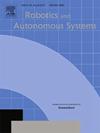不确定多机器人协调臂的非对称有界模糊自适应控制
IF 5.2
2区 计算机科学
Q1 AUTOMATION & CONTROL SYSTEMS
引用次数: 0
摘要
提出了一种模糊自适应控制技术,用于确定协作机器人在抓取一般物体时的期望轨迹。经典模糊逻辑系统通常用于补偿一些未知的非线性连续函数,但其逼近精度往往有限。为了解决这一问题,在Mamdani型或Takagi-Sugeno (T-S)型fls的输入中引入了非零时变参数。此参数允许通用逼近,使系统能够通过自适应规则自动调整逼近精度。未知的非线性连续函数用齐次函数的组合形式表示,然后用fls逼近。与以往的模糊自适应控制方法不同,该方法克服了有限通用近似域的局限性。此外,该方法可以计算T-S型fls的结果系数,减少了控制器的计算负荷。所提出的滑模表面在保证所需的跟踪性能方面是有效的,闭环系统中的所有信号都是均匀最终有界的。通过各种仿真结果进一步验证了控制方案的有效性。本文章由计算机程序翻译,如有差异,请以英文原文为准。
Asymmetric bounded fuzzy adaptive control for uncertain coordinative multiple robot manipulators
This work presents a fuzzy adaptive control technology for determining the desired trajectory of collaborative robot manipulators when grasping a general object. While the classical fuzzy logic systems (FLSs) are commonly used to compensate for some unknown nonlinear continuous functions, their approximation accuracies are often limited. To address this issue, a non-zero time-varying parameter is introduced in the input of Mamdani type or Takagi–Sugeno (T–S) type FLSs. This parameter allows for universal approximation, enabling the system to automatically adjust the approximation precision through adaptive rules. The unknown nonlinear continuous functions are represented using a combined form of homogeneous functions, which are then approximated using FLSs. Unlike previous fuzzy adaptive control schemes, this approach overcomes the limitation of a finite universal approximation domain. Additionally, the proposed method can calculate the coefficients of consequents in T–S type FLSs, reducing the computational load of the controller. The effectiveness of the proposed sliding mode surface is demonstrated in ensuring the required tracking performance, with all signals in the closed-loop system being uniformly ultimately bounded (UUB). The efficiency of the control scheme is further demonstrated through various simulation results.
求助全文
通过发布文献求助,成功后即可免费获取论文全文。
去求助
来源期刊

Robotics and Autonomous Systems
工程技术-机器人学
CiteScore
9.00
自引率
7.00%
发文量
164
审稿时长
4.5 months
期刊介绍:
Robotics and Autonomous Systems will carry articles describing fundamental developments in the field of robotics, with special emphasis on autonomous systems. An important goal of this journal is to extend the state of the art in both symbolic and sensory based robot control and learning in the context of autonomous systems.
Robotics and Autonomous Systems will carry articles on the theoretical, computational and experimental aspects of autonomous systems, or modules of such systems.
 求助内容:
求助内容: 应助结果提醒方式:
应助结果提醒方式:


